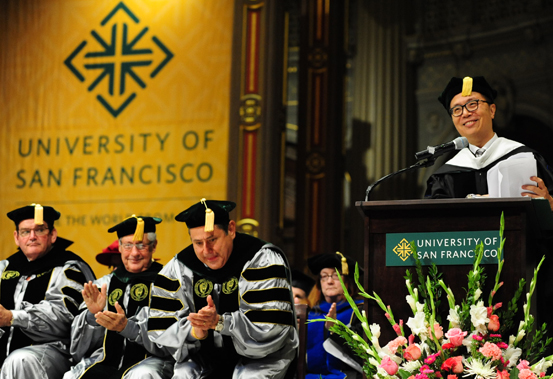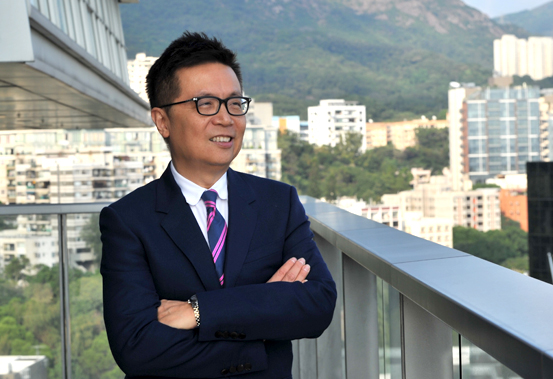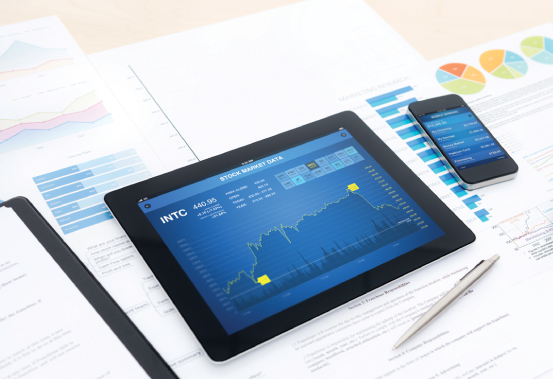Alfred Chuang is the Chairman, CEO and Founder of Magnet Systems, Inc., a California-based company producing enterprise applications for mobile which work with contextual awareness and complex transactions. Alfred is a member of the College of Business International Advisory Board. In this interview, Alfred talks about the role of venture capital in innovation, his career in IT innovation into the Smartphone era, and the role of big data in the health sector.
Alfred Chuang addresses congregation at the University of San Francisco
Innovation and venture capital
You have started up several companies in the USA. Have you ever tried in Hong Kong?
Well I tried twice to start a software company here, went through a lot of planning, met a lot of people, talked to the government, even got things going in an incubator. But somehow it didn't work out. The business I'm in has an unspoken set of rules. We give people equity; we don't give them a lot of salary. So we give them what can change their lives completely. When you hit it big, it's big like nothing you have ever seen before. You change the world. And you deserve to be rewarded accordingly. But equities are vested over four years, and a subtle set of rules are implied.
So, what happens if it doesn't happen in the first four years?
"I would love to have run a tech company straight out of Hong Kong, and never have had to return to San Francisco. I would have done it in a heartbeat."
You have to assume that you do another four, especially in the business I am in, enterprise software. If you grind it out long enough, you can make something out of it. But the investment could easily be 4 to 8 years. That is not in the dictionary of the people here. I think culturally it is just not what people are used to. To struggle for four years without seeing returns is a tough thing. Look at how fast housing costs can go up in four years. People say: what happens if I don't hit? I would love to have run a tech company straight out of Hong Kong, and never have had to return to San Francisco. I would have done it in a heartbeat.
Is it to do with families holding onto ownership of their businesses?
Here the equity is not divided, so the people that come to work with large families don't really have a stake in the business. That means by default whatever salary they make now is what they make, so it is difficult to establish that trust. Why would they go all out to make it theirs if it is really not theirs? This is different to the typical venture capital model in the USA.
I think it's still possible to reset that mentality, to share equity with employees, which is what a typical startup technological company would do. But that is difficult for the family owners to swallow. So, yes, the family owned thing is in direct conflict with professional management.
But as a society Hong Kong is trying to innovate?
Yes, that is what you see from the government message. It's all about that. I don't think anybody would disagree. People know that intellectual property is worth more than just about anything. They like it a lot. They know there is no manufacturing cost once you invented it. They know the margin is infinite. They like all that. But it takes time and it takes a different structure. It takes a lot more sharing. It needs so much more trust. Trust has to last a lot longer. It is not like you report to me and you have to do what I say. It doesn't work that way.
So innovation through the venture capital model is not common here?
On this side of the Pacific it is yet to happen.
From mainframe to mobile
Your MS in Computer Science thesis was on tabular data objects.
I think I stumbled onto something luckily. This was at the beginning of the 1980s. The world was just in the transition from the mainframe to the desktop computer, and I got a chance to work on some technology that was running UNIX. Back then UNIX was only for academics, not for commercial use. I saw it differently. I thought there is a different way to store data, distributively. This brings more power to the people, especially if you get the data closer to the people.
So I was working on scheduling algorithms for operating systems. This could not be more theoretical and boring! It's great for writing a paper and getting it published, which is what matters to academics. But I wanted something to be used so I jumped on to doing effectively distributed databases and I loved it, and I pretty much got stuck to continually applying this along the way. The world got more distributive and distributed and now effectively everybody is carrying around a pocket computer, a pocket server actually, in their smartphone.
So you're talking about how the databases relate to one another?
Right. The original mainframe architecture calls for all the physical data to sit in a single room. As we moved to distributed systems, the physical data needed to be freed from a single location. The work in distributed applications ultimately required the ability to locate data in distributed locations. Not only did it allow fail-safe operation of replicating data, but it also allowed effective IT operations by allowing data to sit much closer to the user's actual location.
Recently we hear a lot about big data and messy data. Were you prefiguring that kind of work?
Not back in the 80s because it was almost unimaginable that people would have interest in storing completely unstructured data like a picture, for selling you stuff or catering things to you. Most of the big data applications today, if you look at it, are really still working after the fact. They are collecting tremendous amount of data on activities about the user. And at some point they are going to analyze it and do something with that.
What we are doing now is applying big data in real time. People come to browse a website, but they don't buy anything. In the future when you put something into a shopping cart and then don't check out, they are going to incentivize you to check out. So that is applied big data. I think this world will be highly sensitive, highly immediate, and maybe a little annoying!
More adaptive?
Very adaptive and very context-driven. So right at this moment, you would be equipped and would want to buy something. So how could I use this data to cater this to you, so that you finish this transaction right now? That immediacy is becoming ever more critical.
How has the corporate software business changed over the years?
The field that I work in is quite differentiated. People mix enterprise and consumer software almost into one now and you really can't tell the difference. We use this mobile phone for business, but we also use it as consumers, but the people who buy them are very different. The people that buy enterprise software are more structured, more likely to be part of an organization. A typical Chief Information Officer will have somewhere between 5-7% of the budget of revenue to spend a year. So the IT budget of a bank is huge. Their buying patterns are about the same.
The evolution of technological change in enterprise software, has only happened a few times. We went from mainframe computers, which is everything all in one place timeshared; to client-server which is where software is run on PC and it talks to the servers. Then we went to web, which was a huge thing back in the early 2000s. It allowed you to run the same application anywhere you happen to be as long as you have browser access. And now we have mobile.
So what was your role?
With each of these major changes every single application has to be rewritten. Now, rewrite is great for me. That is what I want to do. I want to provide people with the technology needed to facilitate these dramatically different user needs. In that sense my entire career is like a one-trick pony! Whenever that major change happened, I got lucky enough to be right there and try to supply technology to go through with those rewrites.
Smartphone era
In 2008, you set up Magnet Systems. Were you anticipating what has now happened in the Smartphone era?
In 2008 it wasn't that obvious. That was the first year that Android was released, one year after the iPhone was introduced. So no one would have imagined that everyone will have a smartphone in their pocket in just a few years and think it completely normal to search any kind of information, anytime, anyplace. It is addictive, and now everyone is addicted, and the only issue is that many corporate and institutions – including the Hong Kong Government, schools and so on – are still primarily on the web. They are yet to be on mobile. And my interest is to make that happen – to move all of that content into tremendously great mobile applications.
Magnet 'runs apps with contextual awareness'. What does that mean?
There is a big shift from web into mobile. Web computing is static. The great mobile apps that we now have, know where you are and know about what you are doing. So the app knows how to be appropriate, how to ask you a question. So when you ask, it supplies you with all the surrounding information.
So position is essential to a mobile device. Are there any other modalities?
I think a tremendous number. For example, if you are walking there is a certain set of risks. This requires all kinds of giro based data, location data and the sequence of how you get there become relevant. The information you have on your calendar, your recent activities, or maybe a note that said you are hungry, all that changes the way that the app should be asking you a question, and what is appropriate to ask at that point. So the more accurate it is, the better the results.
Every single advertiser is trying to chase this data, to know precisely the psychology that you're in at the moment. If that information can be bought, marketing people will pay. So that means every application needs the same highly contextual information. After a while it will know a lot about what you think, a lot about what you're doing. And I think that's the world we are heading into.
Big data and healthcare
Is there a conflict between using big data and privacy?
I'm going to use a practical example. If you go to any Hong Kong hospital you will notice that the registered nurses or doctors are still carrying a device called a pager, which no one else in the city uses anymore. The pager can only transmit simple messages. Patient data cannot be legally transmitted through more sophisticated systems such as WhatsApp or email to the doctor saying "Patient is having this reaction to the medication." In this case the law is old. Getting certified for the use of mobile phones and individual apps means running into the bureaucracy, and the law kicks in because now we understand how valuable that data is. So privacy only matters when the data is valuable. They know it is valuable because people can sell you stuff.
Is it especially important to use big data in healthcare?
"Saving lives is a no-brainer. So how could we not provide information to that doctor? We better go do that first – and try to safeguard the data later in my opinion."
Do you know what really matters? Imagine a world where your loved ones are in ICU in a hospital and their primary doctor is on duty, but happens to be someplace else, not bedside. But the life support system is sending data direct to the doctor, who is looking at a beautiful application and says "Oh my goodness I know what just went wrong," and rectifies the situation by pushing a bunch of buttons on the phone. This patient gets to live. So I think bureaucracy must be eliminated when it comes to saving lives. That takes much higher precedence than anything else. Saving lives is a no-brainer. So how could we not provide information to that doctor? We better go do that first. And try to safeguard the data later in my opinion.
So liberalization of access to health data is a necessity?
Yes, otherwise they are going to lose competitive advantage and frustrate the people living in Hong Kong. The threat of viruses spreading is a continuous challenge in this place in particular because the weather is warm, distances are close, a lot of touching goes on, and the viruses spread very quickly. We also have a lot of old infrastructure, which allows viruses to spread. So how could we not do everything to improve public health? If somebody is sick, they don't move, they stop, we get people to you. This is the place we should implement this right now. How could we afford not to?
The environment
The environment often gets forgotten when people talk business. Is California in a climate shock?
We definitely are. And I think during the last 6 to 8 months in Silicon Valley in particular there has been almost no way to avoid it. Weekly and sometimes now daily, large trees are falling down on the road because they are so dried up. It's that severe. So it's been a very tough year, without any rain. And how much of that is created by humans that have done damage to our lovely planet? It has to be that reason, because it wasn't like that before. There is no other rational explanation. I am a scientist, trained to explain things the way things are.
How crucial is the situation?
It's a challenge, no doubt. I think the condition that we are in right now is a very severe one. If this winter California doesn't get a lot of rain, we are going to have some serious fires, and we are going to have water rationing problems. It's cyclical: you can't water the plants, therefore the soil has no water and that creates a lot of other problems along the way, this is bad.
People go to live where the jobs are. Because it is exciting, it's a place where invention and reinvention are happening every minute. The gap between rich and poor widens every day. So in some ways the trees have to fall down, in the most critical part of the United States which has the most awareness about the environment. I mean like we have no water. What are we going to do? Literally we have no water. And rationing is not a solution.
How about Hong Kong?
I mean we're looking out this window, you see the smog right? We can see fairly far, but it's hazy on Hong Kong Island. It wasn't like this when I was a kid here at all, because there were no factories in Shenzhen, not everyone had their air conditioning on all the time, there weren't this many cars. Renewable energy, solar, I mean we have to do it. I am actually stunned that there is no solar panel anywhere we can see from here. I mean what is wrong with this place? So those are the things we have to do. We can't afford to damage this place, our earth any further. We have to stop, we really have to.
Adopting solar panels often happens in response to incentive structures set up by the government.
That's right and education. I mean you need an enormous amount of education to know, not only to save costs, but to make the right decision. Every bulb should be LED because they generate close to no heat and you don't have to change them for years. How could you not put one in? It would be crazy not to do it.
Is there any light at the end of the tunnel?
Of course there is. Hong Kong remains one of the most educated, multicultural, modern and smart cities where it's people has this insatiable need to upgrade and improve constantly. I see the urge for a much improved waste recycle culture, use of solar and wind power technology, popularization of alternative energy vehicles like electric cars, and use of heat insulation in building structure. I believe the sum of these actions will lead to a much greener, healthier Hong Kong.




